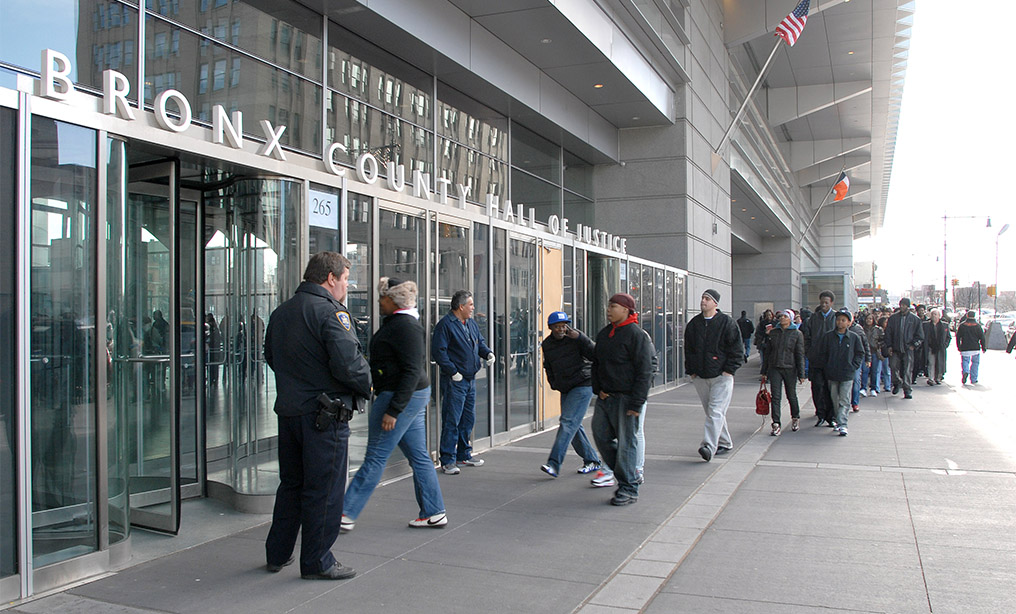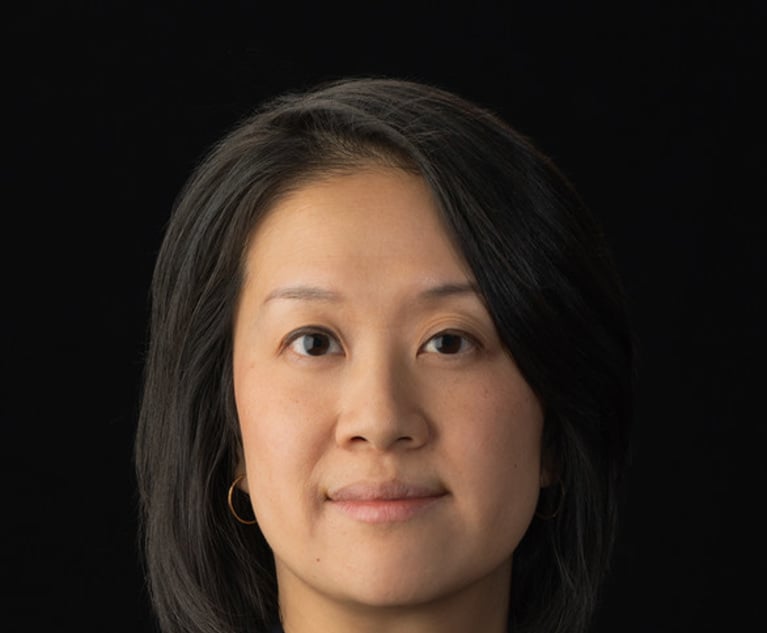NY State Courts Broker Settlement in Suit for Delays in Bronx Misdemeanor Courts
The Bronx Defenders filed a suit against the court system on behalf of a group of defendants who were charged with low-level offenses who said the sluggish pace of their cases through the Bronx courts were violating their speedy-trial rights.
August 09, 2018 at 02:11 PM
5 minute read
 Bronx Hall of Justice. Photo: Rick Kopstein/NYLJ
Bronx Hall of Justice. Photo: Rick Kopstein/NYLJ
The New York state court system has brokered a settlement with a group of plaintiffs who brought a federal suit over extensive delays in the Bronx misdemeanor courts, in which the plaintiffs agreed to back off on litigation but keep the courts on notice to ensure that delays continue to decrease.
In 2016, The Bronx Defenders filed a proposed class action suit against the court system on behalf of a group of defendants who were charged with low-level offenses who said the sluggish pace of their cases through the Bronx courts, which in recent years has been cast as the poster child for court dysfunction, were violating their speedy-trial rights.
But in the months after the suit was filed, the plaintiffs' legal offensive was undermined by the fact that the plaintiffs' cases were resolved, which led to U.S. District Judge George Daniels of the Southern District of New York dismissing the suit for lack of standing.
Daniels did, however, leave the door open for the plaintiffs' attorneys to file an amended complaint, which they did last year, adding three new plaintiffs to the case.
Among them was Luis Virella, who was 69 years old with no criminal record, and whose drunken driving change had been pending for 1,064 days at the time that the amended complaint was filed in January 2017. In the following months, the parties began settlement talks, which lasted about 15 months.
Under the terms of the settlement agreement, which still needs approval by Daniels, the plaintiffs agree to stay litigation for four years but reserve the right to reinstate the litigation. To hold up its end of the bargain, the Office of Court Administration will routinely share data on the progress of misdemeanor cases, particularly for defendants who express a desire to move their cases to trial expeditiously.
According to a news release from attorneys for the plaintiffs, since the suit was first filed, the court system has made considerable progress in reducing the backlog of cases: in that time, the number of misdemeanor cases pending for more than a year fell from more than 2,370 to 513.
Also in that timeframe, the number of cases pending for two years or more fell from 538 to 64.
Despite the improvements, The Bronx Defenders said in a news release, Bronx is an outlier when compared with other boroughs in terms of pending misdemeanor cases: 8 percent of cases in the Bronx have been pending for a year or more, compared with 4 percent for Staten Island, 3 percent for Queens and 2 percent each for Manhattan and Brooklyn.
“People charged with low-level offenses were effectively trapped in a long, painful process of seeking their day in court,” said Scott Levy, special counsel to the criminal defense practice at The Bronx Defenders, in a news release. “We are encouraged by the improvements in misdemeanor case processing, but know that they fall short of the ultimate goal. This settlement will allow us to ensure that the New York courts continue making strides until people in the Bronx have access to their day in court just like New Yorkers in every other borough.”
Johanna Steinberg of The Bronx Defenders also appeared in the case.
In an interview, Levy said that decriminalization of certain offenses, as well as a push to keep defendants from being sent to Rikers Island, has helped OCA reduce its backlogs in the Bronx. But he said defendants still have long waits for trial: according to 2016 statistics on the New York Criminal Courts, the most recent that are publicly available, on average defendants in the Bronx are waiting 885 days for jury trials.
The plaintiffs are also represented by Emery Celli Brinckerhoff & Abady attorneys Matthew Brinckerhoff, Ilann Maazel and Douglas Lieb; and Morrison & Foerster attorneys Ruti Smithline, Gary Lee, Katie Viggiani, James Newtown and Jennifer Brown.
Brown, senior pro bono counsel at Morrison, said the tracking mechanism will help the Bronx courts continue to move toward progress.
“I think it's going to prevent the kind of back slippage with past efforts to address this,” Brown said.
Lucian Chalfen, a spokesman for the Office of Court Administration, said the Bronx courts have seen nothing less than a “renaissance” in the last two years since the beginning of the administration of Chief Judge Janet DiFiore, who made reducing backlogs a piece de resistance of her Excellence Initiative, and since acting Bronx Supreme Court Justice George Grasso took the reins as the supervising judge of the Bronx Criminal Court.
“In the two-plus years since her investiture, where she was crystal clear about what her first and foremost priority as chief judge would be: the efficient operation and elimination of backlogs and delays in all state courts, case backlogs have and continue to drop in each and every judicial district both in New York City and statewide,” Chalfen said.
This content has been archived. It is available through our partners, LexisNexis® and Bloomberg Law.
To view this content, please continue to their sites.
Not a Lexis Subscriber?
Subscribe Now
Not a Bloomberg Law Subscriber?
Subscribe Now
NOT FOR REPRINT
© 2025 ALM Global, LLC, All Rights Reserved. Request academic re-use from www.copyright.com. All other uses, submit a request to [email protected]. For more information visit Asset & Logo Licensing.
You Might Like
View All

Courts Beginning to Set Standards for Evidence Relying Upon Artificial Intelligence
4 minute read
NY Judge Admonished Over Contributions to Progressive Political Causes

Attorneys ‘On the ‘Move: Morrison Cohen Expands White Collar Practice; O’Melveny Brings Back Corporate Finance Partner
6 minute readTrending Stories
- 1'It's Not Going to Be Pretty': PayPal, Capital One Face Novel Class Actions Over 'Poaching' Commissions Owed Influencers
- 211th Circuit Rejects Trump's Emergency Request as DOJ Prepares to Release Special Counsel's Final Report
- 3Supreme Court Takes Up Challenge to ACA Task Force
- 4'Tragedy of Unspeakable Proportions:' Could Edison, DWP, Face Lawsuits Over LA Wildfires?
- 5Meta Pulls Plug on DEI Programs
Who Got The Work
Michael G. Bongiorno, Andrew Scott Dulberg and Elizabeth E. Driscoll from Wilmer Cutler Pickering Hale and Dorr have stepped in to represent Symbotic Inc., an A.I.-enabled technology platform that focuses on increasing supply chain efficiency, and other defendants in a pending shareholder derivative lawsuit. The case, filed Oct. 2 in Massachusetts District Court by the Brown Law Firm on behalf of Stephen Austen, accuses certain officers and directors of misleading investors in regard to Symbotic's potential for margin growth by failing to disclose that the company was not equipped to timely deploy its systems or manage expenses through project delays. The case, assigned to U.S. District Judge Nathaniel M. Gorton, is 1:24-cv-12522, Austen v. Cohen et al.
Who Got The Work
Edmund Polubinski and Marie Killmond of Davis Polk & Wardwell have entered appearances for data platform software development company MongoDB and other defendants in a pending shareholder derivative lawsuit. The action, filed Oct. 7 in New York Southern District Court by the Brown Law Firm, accuses the company's directors and/or officers of falsely expressing confidence in the company’s restructuring of its sales incentive plan and downplaying the severity of decreases in its upfront commitments. The case is 1:24-cv-07594, Roy v. Ittycheria et al.
Who Got The Work
Amy O. Bruchs and Kurt F. Ellison of Michael Best & Friedrich have entered appearances for Epic Systems Corp. in a pending employment discrimination lawsuit. The suit was filed Sept. 7 in Wisconsin Western District Court by Levine Eisberner LLC and Siri & Glimstad on behalf of a project manager who claims that he was wrongfully terminated after applying for a religious exemption to the defendant's COVID-19 vaccine mandate. The case, assigned to U.S. Magistrate Judge Anita Marie Boor, is 3:24-cv-00630, Secker, Nathan v. Epic Systems Corporation.
Who Got The Work
David X. Sullivan, Thomas J. Finn and Gregory A. Hall from McCarter & English have entered appearances for Sunrun Installation Services in a pending civil rights lawsuit. The complaint was filed Sept. 4 in Connecticut District Court by attorney Robert M. Berke on behalf of former employee George Edward Steins, who was arrested and charged with employing an unregistered home improvement salesperson. The complaint alleges that had Sunrun informed the Connecticut Department of Consumer Protection that the plaintiff's employment had ended in 2017 and that he no longer held Sunrun's home improvement contractor license, he would not have been hit with charges, which were dismissed in May 2024. The case, assigned to U.S. District Judge Jeffrey A. Meyer, is 3:24-cv-01423, Steins v. Sunrun, Inc. et al.
Who Got The Work
Greenberg Traurig shareholder Joshua L. Raskin has entered an appearance for boohoo.com UK Ltd. in a pending patent infringement lawsuit. The suit, filed Sept. 3 in Texas Eastern District Court by Rozier Hardt McDonough on behalf of Alto Dynamics, asserts five patents related to an online shopping platform. The case, assigned to U.S. District Judge Rodney Gilstrap, is 2:24-cv-00719, Alto Dynamics, LLC v. boohoo.com UK Limited.
Featured Firms
Law Offices of Gary Martin Hays & Associates, P.C.
(470) 294-1674
Law Offices of Mark E. Salomone
(857) 444-6468
Smith & Hassler
(713) 739-1250






